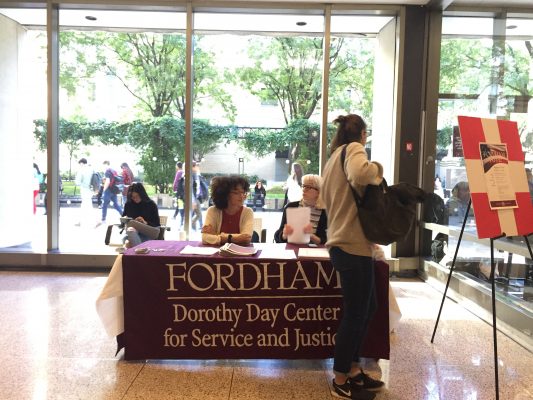Fordham Promotes Voter Registration
Student volunteers help members of the Fordham community register to vote. (PHOTO BY ELIZABETH LANDRY/ THE OBSERVER)
October 13, 2016
The deadlines for this general election’s voting registration window are fast approaching, with New York’s falling on Oct. 14. At Fordham Lincoln Center, students are urged by peer leaders and university faculty to get themselves registered, especially those who come from ’swing states.’
A swing state is one in which the two major political parties’ supporters number nearly the same, and are often considered bellwethers for election outcomes. According to Politico, the important 11 swing states in the 2016 general election are Colorado, Florida, Iowa, Michigan, Nevada, New Hampshire, North Carolina, Ohio, Pennsylvania, Virginia and Wisconsin.
Political science professor Zein Murib said, “If you are a student at Fordham from Wisconsin or Colorado or Nevada, you should definitely be voting in Wisconsin or Colorado or Nevada. But overall, you should be voting, period.”
Kathryn Hornyak, Fordham College at Lincoln Center (FCLC) ’20, of Pittsburgh, PA, said that she feels a particular responsibility to vote, both as a Pennsylvanian and a millennial. She is supporting Hillary Clinton for President.
“In a swing state, there is ultimately a majority that is going to come out on top,” Hornyak said. “What if that majority happens to be a Trump majority? Then my vote doesn’t really count. But the whole purpose of me wanting to vote by absentee ballot is so I can throw my hat in the ring over there. Pennsylvania needs it more than New York does.”
Hornyak said, “We are the youngest generation of voters, and we could swing it.”
Murib explained that young voters in every state have a huge potential power.
“The young electorate, people who are voting for the first and second time, is the most diverse, tolerant and well-educated segment of the electorate at this point,” she said, noting that millennials’ voting power will match that of the baby boomers for the first time.
The perfect example of this phenomenon is the steps toward the political left which Clinton has taken after support from Democratic youth of Sen. Bernie Sanders, according to Murib. She said that it is in students’ best interests to vote.
“If you start digging on just one thing that matters to you, you’ll start to see that it’s all connected,” Murib said. “If the Black Lives Matter movement is important to you, you have to ask yourself, ‘Hillary Clinton and Donald Trump may do nothing to address the problems.’ If you start to dig a little deeper you see that under a Clinton administration the opportunities for protest and activism will be much more likely than under a Trump administration, who’s said things which basically mean silencing protests.”
Lesley Massiah-Arthur, associate vice president of government relations and urban affairs, said that students also have reasons closer to home to make informed votes.
“You pay taxes,” she pointed out. “Or if you don’t pay taxes, someone is paying a tax for you to be here. So at some point you’re going to be affected by it, whether it’s today with this election or years down the line.”
She explained that the best opportunity to put issues important to students on the table is to register and vote.
Massiah-Arthur also cautioned students, “Just because you might not know [about the candidates], that doesn’t absolve you of your responsibility of knowing. If you want candidates to speak to your issues, then it’s incumbent upon you to also engage those elected officials or those who are looking for your vote.”
Ignorant voting, she said, is as if a stranger shows up at your door saying he will fix your sink, and you allow him into your home and pay him $1,000, no questions asked.
“Would you let this person just come inside your house?” she asked. “Absolutely not. If you wouldn’t do that for any other part of your life, then why would you do that with regards to your vote?” She recommended students visit websites like Rock the Vote and Vote Your Voice for nonpartisan candidate information.
From Oct. 3–7, Massiah-Arthur, United Student Government (USG) and the Dorothy Day Center for Service and Justice provided a table on the indoor plaza of Lowenstein where passersby could register to vote or get information to procure their own absentee ballots.
Over the summer, USG President Leighton Magoon, FCLC ’17, and Fordham College Rose Hill’s (FCRH) USG President Daniel Stroie, FCRH ’17, joined Massiah-Arthur’s initiative. According to Massiah-Arthur, colleges and universities are required by the Higher Education Act to provide registration forms to students, but students have instead volunteered.
Fordham Lincoln Center students had mixed opinions of voting.
“It’s very difficult for me to pick someone to vote for because our two candidates, for me, aren’t working,” Brenda Ubaldo, FCLC ’17, said. “I definitely think that every vote counts, that’s why I don’t want to make a mistake. It’s overwhelming.”
Qasim Suhail, FCLC ’18, who registered at the table, was more optimistic, and said “I’m a commuter freshmen mentor, so in my emails I sent a whole paragraph about how it’s important to vote.”
“As we are the millennial generation, we are often chastised for not participating in the election process enough, and I feel like we’re surrounded by so much information that makes us more informed than we might have been in the past,” Magoon said. “We can use that to our advantage to make informed decisions on what candidate to support.”
Hornyak boiled down the election with words by Broadway playwright Lin-Manuel Miranda.
“Even though so many people say, ‘Neither 2016,’ there’s a quote from Hamilton: ‘We are engaged in a battle for our nation’s very soul,’ and that’s what this is,” she said. “What do we want the character of our nation to look like to the rest of the world? To ourselves?”












